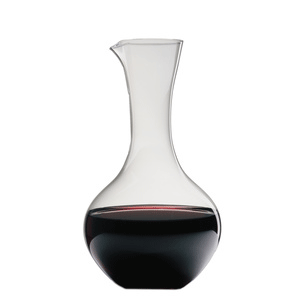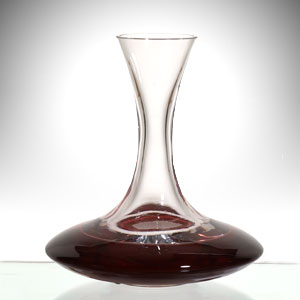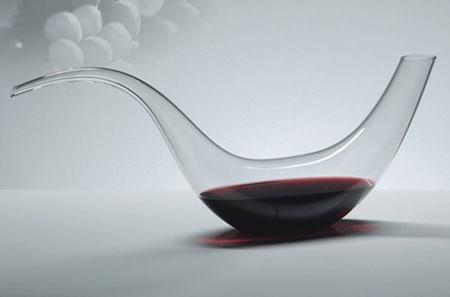
What is decanting? Why should I do it?
Many people have seen others decant wine before drinking it without knowing why. Moreso, many people decant wine themselves without knowing why. There are many benefits to decanting, but it's good to know how and why they work.
First of all, decanting is really beneficial only to red wines. Yes, there may be some white wines which are meant to age and thus could possibly benefit from decanting, but as a general rule, only red wines are decanted.
Now, what happens when you decant wine? Decanting allows oxygen to enter the wine. The wine has been sitting in a barrel/bottle for a very long time without any access to oxygen. Though oxygen is a bad thing for the aging process (think of a corked bottle...tastes like vinegar), a little bit right before drinking helps mellow out the flavors and develop depth and complexity.
Not sure what I mean when I say words like "mellow, depth, and complexity?" Try out this experiment. Get a young bottle of cabernet sauvignon. Young being about 3 years old. Open it, and immediately pour a small amount into a glass. Try it, see what stands out. Then pour the rest in a decanter. 1 hour later, try a little more. Then 2 hours, and 3 hours. If you're having a party of people over, you can also try it the opposite way. Take 4 bottles of wine, decant one of them 3 hours before drinking, one 2 hours, and one 1 hour before drinking. Then open the final bottle when ready to drink. Pour all four glasses side by side, and taste in progression from most recent to longest, and see how the flavors have developed.
The reason I suggest doing a young red is because the benefits are most greatly observed with these younger reds who are very tannic and even harsh when first opening. Decanting allows them to become more drinkable and pleasant. That being said, there is a lot of argument for much older wines whether decanting is beneficial or even necessary. Although most agree that decanting is good for older wines for the purpose of removing the sediment, the argument stands that old wines do not need more air because they have been left to age for so long, their depth of flavor is already developed. Whether this is true or not depends on who you speak with; however, most agree that decanting a young red for at least 1-3 hours definitely benefits the wine.
If you have a moment, I highly recommend watching this episode of Wine Library TV. He's a little intense about decanting, and his example wine is a very expensive bottle, but even at the end he mentions even the $8 bottle of wine can really benefit from decanting.

Do I have to have a fancy, expensive decanter?
No. The only recommendation I can even find online is to make sure to purchase a clear glass/crystal decanter so you can see the wine, see any sediment, etc. Other than that, any decanter will do. From the very simple, shown above, to the completely absurd:


What if I don't have 3 hours to spare to decant?
There are some "home remedies" and available contraptions out there to speed up the breathing process.
An older trick I've heard of is whipping the wine around in a blender a couple of times to quickly force some air in. Does it work? Who knows. Will it do any harm? Probably not. Will you look silly if anyone is watching you? Probably.
Some newer tools are being sold lately that boast the ability to "aerate" the wine. The Vinturi boasts "All of the taste with none of the wait." With this device, sold for about $40 and found everywhere, you hold it over the wine glass, and pour the wine through it. You can hear it bubbling through, forcing air into it. The Soiree is a device that attaches to the neck of the bottle and thus doesn't require any additional effort while pouring. It works by sloshing the wine around a bit before letting it hit your glass.
Both of these tools have essentially the same goal: speed up the breathing process. There are plenty of people out there who think they do help quite a bit, and others who think it's a lot of hooey. I'd guess they help a little more than just pouring straight into a glass, but not as well as decanting for 3 hours or more. Whether you see any noticeable different is up to you!
And finally, the old standby, just swirling it around in your glass. You see so many people doing this, and most don't even notice they're doing it. This helps keep the wine moving, adding air and breaking down the tannins. While it doesn't compare to a couple hours of decanting, it does continue the breathing process.
No matter your method, it is a fairly well-accepted ideal that decanting wine can help open up the flavors in a great young red, regardless of price.


0 comments:
Post a Comment